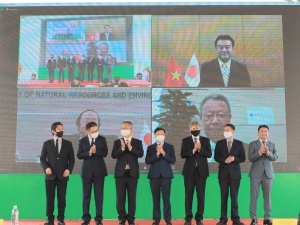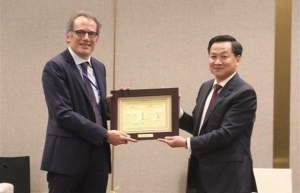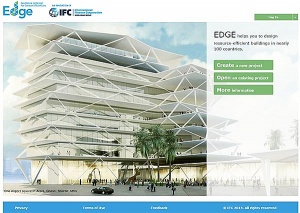IFC launches financing platform to respond to global food crisis
The war in Ukraine and an uneven global recovery from the pandemic have added to rising levels of hunger and malnourishment, which already have been worsened by climate change and increasingly severe weather events that are damaging harvests.
A core part of the financing, which will be provided through the new Global Food Security Platform, will support sustainable production and delivery of food stocks to countries affected by food instability. Support will be aimed at facilitating trade of food commodities, delivery of inputs to farmers, supporting efficient production in major origins, including Ukraine, and effective distribution of food products.
Financing will also focus on long-term actions to improve the resilience of the global food system and lessen its climate and ecological footprint. This includes investing in increasing efficient crop production, improving access to fertilisers, greening fertiliser production and use, reducing crop loss and food waste, improving supply chain efficiency, and mitigating infrastructure bottlenecks.
The $6 billion will be used to support private sector companies along the food value chain by leveraging IFC's sectoral expertise in agribusiness, manufacturing, infrastructure, and technology, as well as the financial sector and trade finance.
"The private sector has an essential role to play in alleviating food insecurity and in creating lasting solutions. By strengthening supply chains and ensuring that people have access to and can grow affordable food, this initiative will contribute to building resilient food systems in the most vulnerable regions," said IFC's managing director Makhtar Diop.
The platform will supplement the World Bank's commitment of $30 billion in response to the food crisis. IFC is also stepping up engagements with other partners, including development finance institutions, foundations, banks as well as a range of private companies, in order to mobilise collective action to address global food security challenges.

IFC promotes waste-to-energy solutions as Vietnam shifts to low-carbon economy As Vietnam accelerates efforts to reach net-zero carbon emissions by 2050, the International Finance Corporation (IFC) is providing a $30 million financing package to fund the construction of a waste-to-energy plant in Bac Ninh province. The aim is to increase the province’s waste treatment capacity and reduce its environmental footprint while protecting residents from health risks associated with untreated waste.

IFC pledges to further support Vietnam The International Finance Corporation (IFC) will continue its support to Vietnam, especially in green growth, climate change response and increasing productivity in the private sector, IFC Vice President for Asia and Pacific Garcia Mora pledged on April 15.

IFC to support Vietnam's transition to a low-carbon economic growth model The International Finance Corporation (IFC) – a member of the World Bank Group – announced on May 11 that it will support Vietnam to transit to a low-carbon economic growth model.
What the stars mean:
★ Poor ★ ★ Promising ★★★ Good ★★★★ Very good ★★★★★ Exceptional
Related Contents
Latest News
More News
- Trung Nam-Sideros River consortium wins bid for LNG venture (January 30, 2026 | 11:16)
- Vietnam moves towards market-based fuel management with E10 rollout (January 30, 2026 | 11:10)
- Envision Energy, REE Group partner on 128MW wind projects (January 30, 2026 | 10:58)
- Vingroup consults on carbon credits for electric vehicle charging network (January 28, 2026 | 11:04)
- Bac Ai Pumped Storage Hydropower Plant to enter peak construction phase (January 27, 2026 | 08:00)
- ASEAN could scale up sustainable aviation fuel by 2050 (January 24, 2026 | 10:19)
- 64,000 hectares of sea allocated for offshore wind surveys (January 22, 2026 | 20:23)
- EVN secures financing for Quang Trach II LNG power plant (January 17, 2026 | 15:55)
- PC1 teams up with DENZAI on regional wind projects (January 16, 2026 | 21:18)
- Innovation and ESG practices drive green transition in the digital era (January 16, 2026 | 16:51)


 Tag:
Tag:



















 Mobile Version
Mobile Version